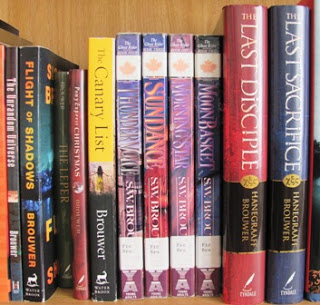
Back in July, I told myself that I would take a break from reviewing books for a bit. I’d just gotten through a big stack and thought it might be fun to read without a deadline hanging over my head. Then I saw a new Sigmund Brouwer book and, well, you know me. He’s one of my favourite authors and so The Canary List landed in my book pile.
Jaimie Piper is a twelve-year-old foster child who can sense Evil. When Evil shows up at her foster home one evening, she runs to the only person she can trust—her teacher, Crockett Grey. However, this isn’t a good night for Crockett; it’s the anniversary of his daughter’s death and he just wants to get drunk to forget that. Things get even worse the next morning when Social Services arrives with questions about why Jaimie spent the night at his house—and who caused the fire that burned Jaimie’s foster home to the ground. Crockett’s only alibi, his neighbour Nanna, is missing.
As Crockett tries to defend himself against charges of pedophilia, he finds himself caught in the middle of events that make no sense. Who is framing him for things he didn’t do? Why? And what does it have to do with Jaimie? His attempts to find answers—from his lawyer (hired by a mysterious benefactor), a savvy computer hacker, and even Jaimie’s psychiatrist—only leave him with more questions. When he’s kidnapped and hauled to Rome, he becomes a man on a mission: to clear his good name and get back to normal life with his son, Mickey.
 As usual, Brouwer writes an intriguing, spell-binding novel. Even though every chapter was short (point of view changed frequently, keeping suspense high), it was hard to read for just a few minutes. I found myself devouring it chunks at a time, wanting to know what happened. Part of that was because the “conspiracy” is set within the Vatican and the Catholic Church. Was this just another Dan Brown novel, full of inaccuracies painted as facts?
As usual, Brouwer writes an intriguing, spell-binding novel. Even though every chapter was short (point of view changed frequently, keeping suspense high), it was hard to read for just a few minutes. I found myself devouring it chunks at a time, wanting to know what happened. Part of that was because the “conspiracy” is set within the Vatican and the Catholic Church. Was this just another Dan Brown novel, full of inaccuracies painted as facts?
Pedophilia and child abuse is a huge issue within the Catholic Church. Brouwer raises the issue without flinching, looking at the ways that many priests are never charged with abuse while teachers like Crockett can have their careers ruined over false accusations. Yet Brouwer also points out, through psychiatrist Madelyne Mackenzie, that the Catholic Church is “an institution that does so much good all across the world. It’s like a beautiful mansion, with one horrible, dark closet. But the closet draws all the attention, and the fact that the mansion is beautiful too often gets lost because of that.”
For anyone with further questions about the issues Brouwer raises in the novel, he provides a list of sources at the end (I don’t remember Dan Brown proving he did any research for his thriller). Christian readers will likely be familiar with the idea of demons from books by Frank Peretti, and here Brouwer looks at different views about demons through the history of the Church. I liked the weave of information he spun through the story and found myself amazed at his research. If I ever meet Brouwer again, I ‘ll ask him where he got the idea for The Canary List.
“There is only one goal for any piece of writing: push an emotional button.” ~ Sigmund Brouwer

4 Comments
Jo – hmm, I never thought of looking for him on FB. I’ll go do that!
Karen – I also grew up reading SB’s books and now really enjoy his adult fiction as well.
Tracy – I know the feeling! But some books you just gotta make time for… 🙂
I’ve been looking and thinking and looking and thinking about reading this one too. I’m also a fan of Brouwer. I just have so many other books in my queue! Looks like I’m adding another …
Wow, what a plot! My kids liked his books for their age; we’d often read them aloud together. I may have to check this one out, thanks for the review!
Have a great weekend,
Karen 🙂
I loved this book! I was going to review it too, but got busy around the time I read it. You could ask him on Facebook where he got the idea.